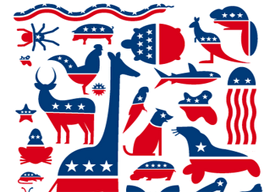
October 07, 2012

Not all advocates of state power should be equated with Obama partisans, any more than Jeffersonians should be seen as “conservatives.” In the late eighteenth century the political struggle in the US was between nationalists and regionalists. That struggle no longer corresponds to what has developed in the US in the last few generations. We now have a highly centralized welfare state that two national parties are trying to get hold of to accommodate their partisans.
We are also living in a political entity that is too multicultural to be compared to the early American nation state, which was relatively homogeneous culturally and religiously. In this context it is foolish to paste dusty political labels from the past onto a drastically different political present. What now exists is a ritualized battle between two party blocs centered on the fruits of an expanding administrative state. The power of state governments was so vastly reduced in the twentieth century that it has become a mere shadow of what the Jeffersonians wished to energize as a bulwark of the people’s freedom. Nor have these changes called forth a torrential protest. Most voters seem delighted with our expanding welfare state and would be furious if we tried to shrink it.
Since the terms “conservative” and “liberal” have become empty rhetorical phrases, it is not surprising that some Obama voters are being classified as inconsistent “conservatives.” Why not call them Martians? The operative terms are truly free-floating. They function to allow journalists and politicians to differentiate their mostly indistinguishable products. To me the consensus is far more obvious than those ideological distinctions the media insists on emphasizing. George Will is right that Americans mostly consider themselves to be C rather than L. But this matters about as much as the fact that some voters have black hair and others brown hair. The real dividing line is between those who seek to dismantle our centralized state and those who support its continuation and inevitable growth. On one side, we have the “conservatives” together with the “liberals,” who are really neither one nor the other; on the other side, we find about one to two percent of the adult population voting for a third party.
I suggest we change our current terminology to something as descriptively useful as “social democrats A” and “social democrats B.” At the very least, it would be nice never again to gaze at anything like Will’s silly column explaining to us his “cognitive dissonance” in relation to our party politics. Unlike him, I”ve no problem understanding why many “conservatives” are voting for Bam. They”re not “conservatives” any more than I”m the Man in the Moon.